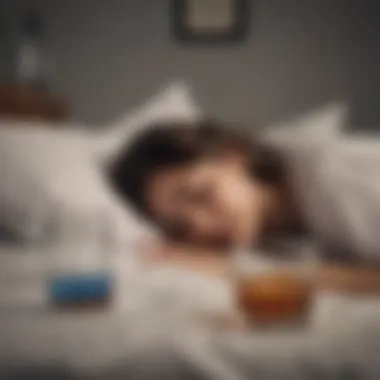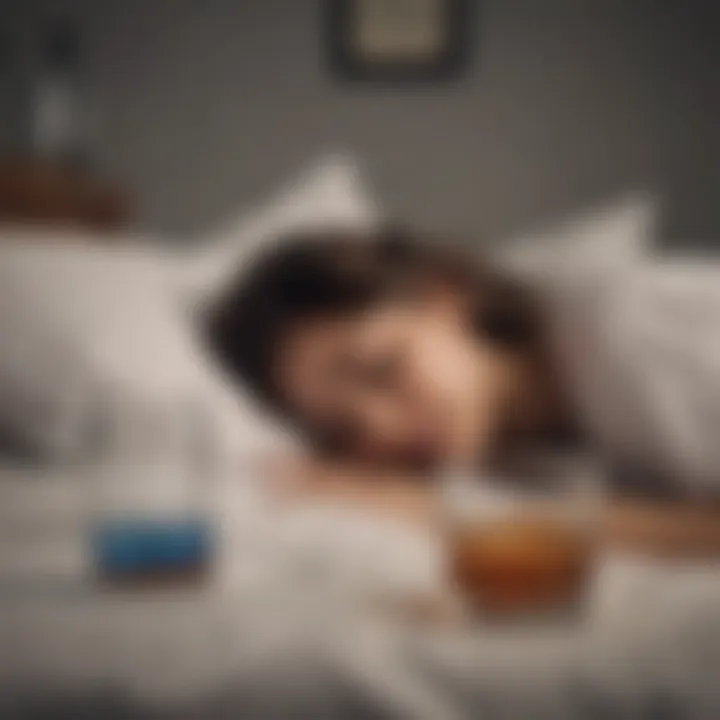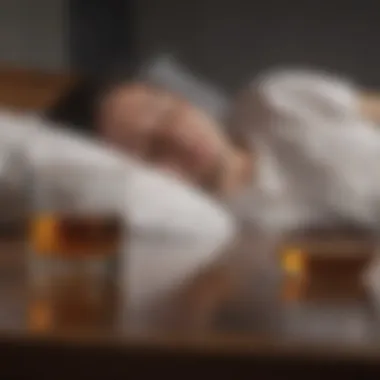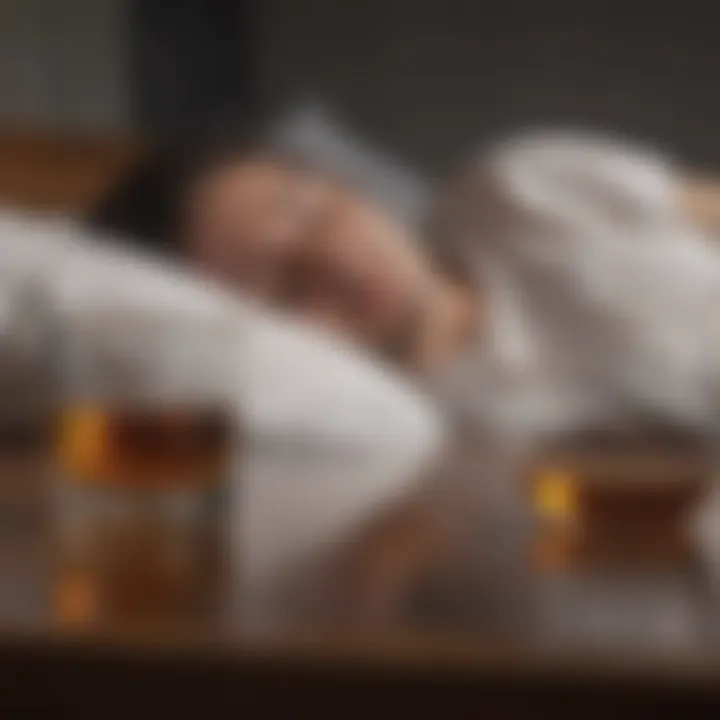Unraveling the Scientific Enigma of Alcohol's Sleep-Inducing Effects


Alcohol's impact on sleep is a topic that intrigues many, prompting us to delve into the interplay between this common indulgence and our nightly rest. It's crucial to comprehend the scientific mechanisms underpinning why alcohol can induce drowsiness. Understanding the physiological and neurological pathways through which alcohol exerts its calming effects allows us to appreciate the intricate relationship between alcohol consumption and sleep patterns. Exploring these connections sheds light on how alcohol interacts with the brain and body functions, leading to its sedative properties during the sleep cycle.
Examining Alcohol's Effects on Brain Functions
Alcohol's sedative properties stem from its influence on various neurotransmitters that regulate the sleep-wake cycle. By disrupting the delicate balance of brain chemicals like gamma-aminobutyric acid (GABA) and glutamate, alcohol acts as a central nervous system depressant, slowing down neural activity and inducing relaxation. This modulation of neurotransmitter activity contributes to the drowsiness often experienced after alcohol consumption. Furthermore, alcohol's impact on the prefrontal cortex, the brain region responsible for decision-making and impulse control, can impair cognitive functions related to sleep regulation, potentially disrupting the quality of rest obtained.
Unraveling Alcohol's Impact on Sleep Patterns
The relationship between alcohol and sleep extends beyond its immediate sedative effects, encompassing the more intricate aspects of sleep architecture. While alcohol can initially promote faster sleep onset, it can disrupt the later stages of sleep, such as rapid eye movement (REM) sleep, crucial for cognitive processes and emotional regulation. Additionally, alcohol interferes with the body's circadian rhythm, altering the natural sleep cycle and potentially leading to fragmented sleep patterns. Understanding these disruptions to sleep architecture highlights the complexity of alcohol's influence on the overall sleeping experience and underscores the importance of considering the long-term effects of alcohol consumption on sleep quality.
Synthesizing Alcohol's Impact on Sleep Regulation
Understanding Alcohol's Impact on Sleep
In this article, the focus is on dissecting the intricacies of how alcohol affects sleep quality. Understanding Alcohol's Impact on Sleep is crucial as it sheds light on the physiological and neurological mechanisms at play when alcohol is consumed before bed. By exploring alcohol's initial effects on the body, its influence on brain chemistry, the disruption of sleep cycles, and the role of alcohol metabolism in inducing sleepiness, readers can comprehend the complexities involved. Delving into these aspects can provide valuable insights into why alcohol is often associated with inducing sleep.
Alcohol's Initial Effects on the Body
Immediate Relaxation and Euphoria:
When one consumes alcohol, the immediate response observed is a sense of relaxation and euphoria. This feeling of immediate relaxation and euphoria contributes significantly to the sedative effects of alcohol. The unique characteristic of this initial relaxation and euphoria lies in its ability to create a temporary state of calm and well-being, often sought after by individuals looking to unwind. However, the downside of this immediate relaxation and euphoria is its transient nature, potentially leading to increased alcohol intake to prolong these sensations.
Suppression of Central Nervous System Activity:
Another critical aspect of alcohol's initial effects on the body is its ability to suppress central nervous system activity. This suppression plays a key role in promoting feelings of drowsiness and sedation. By dampening the activity of the central nervous system, alcohol induces a state of tranquility and relaxation. While this suppression can help individuals unwind and destress after a long day, excessive consumption can result in impaired cognitive function and coordination, highlighting a potential disadvantage of this effect.
Alcohol's Influence on Brain Chemistry
Interference with Neurotransmitters:


Alcohol's influence on brain chemistry includes interference with neurotransmitters, impacting various cognitive functions. This interference can lead to alterations in mood, cognition, and behavior. By disrupting the normal functioning of neurotransmitters, alcohol can induce changes in perception and emotional responses. While this interference may contribute to the initial feelings of relaxation, it can also have adverse effects on cognitive processes and emotional stability.
Enhancement of GABA Activity:
A significant impact of alcohol on brain chemistry is the enhancement of GABA activity. GABA, a neurotransmitter responsible for inhibitory signaling in the brain, is potentiated by alcohol consumption. This enhancement can further reinforce feelings of calmness and relaxation. However, the overstimulation of GABA receptors due to alcohol intake can lead to issues such as tolerance and dependence over time, highlighting a potential disadvantage of this mechanism.
Alcohol's Disruption of Sleep Cycles
Impact on REM Sleep:
One of the notable effects of alcohol on sleep cycles is its impact on REM (rapid eye movement) sleep. REM sleep is crucial for various neurocognitive processes, including memory consolidation and emotional regulation. Alcohol consumption can disrupt this stage of sleep, leading to reduced REM sleep duration and quality. This disruption may impair cognitive functions and emotional processing, potentially affecting overall sleep quality and mental well-being.
Development of Fragmented Sleep Patterns:
Alcohol consumption is also associated with the development of fragmented sleep patterns. These patterns involve multiple awakenings during the night, leading to interruptions in the sleep cycle. The fragmentation of sleep can prevent individuals from achieving deep, restorative sleep stages, impacting their overall sleep quality and daytime functioning. Addressing these fragmented sleep patterns is essential for restoring a healthier sleep architecture and promoting better rest.
Role of Alcohol Metabolism in Sleepiness
Liver Processing and Acetaldehyde Production:
The role of alcohol metabolism in inducing sleepiness involves the processing of alcohol by the liver and the production of acetaldehyde. As the liver breaks down ethanol, a byproduct known as acetaldehyde is generated. Acetaldehyde has various physiological effects, including sedative properties that can contribute to feelings of drowsiness and fatigue. Understanding this metabolic process is vital in comprehending why alcohol consumption can lead to increased sleepiness and disrupted sleep patterns.
Neurophysiological Mechanisms of Alcohol-Induced Sleep
Alcohol's impact on sleep is intrinsically linked to its neurophysiological mechanisms. Understanding how alcohol affects the brain and neurotransmitters sheds light on its sedative properties. By exploring the interaction between alcohol and neurotransmitters, particularly dopamine and serotonin levels, we unravel the intricate process that leads to sleep induction. This section delves into the significance of neurophysiological mechanisms in elucidating why alcohol makes you sleep, offering unique insights into the body's response to alcohol consumption.
Alcohol's Interaction with Neurotransmitters
Alcohol's influence on neurotransmitters, such as dopamine and serotonin levels, plays a pivotal role in its sedative effects. The modulation of these neurotransmitters by alcohol results in altered brain activity, contributing to feelings of relaxation and drowsiness. Understanding how alcohol affects dopamine and serotonin levels provides a comprehensive perspective on its neurophysiological impact on sleep regulation. This discussion highlights the specific mechanisms through which alcohol interacts with these key neurotransmitters, offering a nuanced understanding of the physiological processes involved.
Effects on Dopamine and Serotonin Levels


The effects of alcohol on dopamine and serotonin levels are central to its sedative properties. Alcohol consumption leads to fluctuations in these neurotransmitters, impacting mood, behavior, and sleep patterns. By delving into the intricate interplay between alcohol and dopamineserotonin, we uncover how these changes influence the brain's response to alcohol-induced sleep. Examining the specific alterations in dopamine and serotonin levels enhances our comprehension of why alcohol induces sleepiness, providing a scientific basis for its role in altering sleep-wake cycles.
Influence on Hypothalamus and Sleep Regulation
Alcohol's influence on the hypothalamus disrupts essential circadian rhythms, affecting sleep regulation. By examining how alcohol interferes with the brain's control center for sleep-wake cycles, we gain insights into the mechanisms underlying alcohol-induced sleep disturbances. This section explores the disruption of circadian rhythms caused by alcohol consumption and its implications for overall sleep quality.
Disruption of Circadian Rhythms
Disrupting circadian rhythms is a significant consequence of alcohol's impact on the hypothalamus. The imbalance in sleep-wake cycles triggered by alcohol consumption can lead to disrupted circadian patterns, resulting in irregular sleep architecture. Analyzing the disruption of circadian rhythms elucidates how alcohol-induced changes in the hypothalamus affect the body's natural sleep regulatory mechanisms, underscoring the intricate relationship between alcohol consumption and sleep quality.
Impact of Alcohol on Sleep Quality
Alcohol consumption is associated with poor sleep architecture, impacting the overall quality of sleep. Understanding how alcohol influences sleep quality is crucial in comprehending the consequences of alcohol-induced sleep disruptions. By exploring the association between alcohol consumption and compromised sleep patterns, we unveil the detrimental effects of alcohol on sleep architecture and its implications for overall well-being.
Association with Poor Sleep Architecture
The association between alcohol consumption and poor sleep architecture is evident in disrupted sleep patterns and reduced sleep efficiency. Alcohol's impact on sleep quality manifests through fragmented sleep, increased awakenings, and altered REM sleep stages. Analyzing the association with poor sleep architecture offers valuable insights into the negative impact of alcohol on sleep continuity and depth, highlighting the importance of addressing alcohol-induced sleep disturbances for optimal rest and rejuvenation.
Biological Responses to Alcohol Consumption
In this section, we delve into the intricate biological responses triggered by alcohol consumption. Alcohol, a complex substance, interacts with various biological systems in the body, leading to diverse physiological effects. Understanding the biological responses to alcohol is crucial in comprehending its sedative effects on sleep patterns. When alcohol enters the body, it undergoes metabolic processing that influences organ functions and overall health. By exploring the metabolic pathways of alcohol, we can unravel its impact on energy utilization and hormonal balance.
Metabolic Processing of Alcohol
Alcohol metabolism involves the breakdown of ethanol, the active ingredient in alcoholic beverages. This process occurs mainly in the liver, where ethanol is converted into acetaldehyde, a toxic byproduct. Ethanol breakdown is a crucial step in alcohol metabolism, as it determines how quickly alcohol exits the body. The energy utilization associated with ethanol breakdown plays a significant role in the body's metabolic functions. Understanding the metabolic processing of alcohol sheds light on how the body copes with the presence of this substance and its consequences on overall well-being.
Ethanol Breakdown and Energy Utilization
Ethanol breakdown involves several enzymatic reactions that convert ethanol into acetaldehyde and subsequently into acetic acid. These reactions require energy input, influencing the body's metabolic rate. The breakdown of ethanol contributes to the production of ATP, the body's primary energy currency. This process impacts cellular functions and organ systems, influencing various physiological processes. Ethanol breakdown and energy utilization play a vital role in maintaining metabolic balance and sustaining essential bodily functions.


Hormonal Changes and Sleep Regulation
The influence of alcohol on hormonal balance is a critical aspect of its impact on sleep regulation. Hormones play a key role in controlling the sleep-wake cycle, and alcohol consumption can disrupt their normal production and release. By examining the hormonal changes induced by alcohol, we can better understand how this substance affects sleep quality and duration.
Influence on Melatonin Production
Melatonin, often referred to as the 'sleep hormone,' is essential for regulating the circadian rhythm and promoting sleep onset. Alcohol consumption can interfere with the production of melatonin, leading to disrupted sleep patterns. The influence of alcohol on melatonin production alters the body's natural sleep-wake cycle, affecting both the onset and quality of sleep. Understanding how alcohol impacts melatonin levels provides insights into the mechanisms behind alcohol-induced sleep disturbances and their potential long-term effects.
This section provides a detailed exploration of the biological responses to alcohol consumption, focusing on the metabolic pathways of alcohol and its effects on hormonal balance. By examining ethanol breakdown and its energy utilization, as well as the influence of alcohol on melatonin production, we gain a deeper understanding of how alcohol affects the body's ability to sleep.
Behavioral and Environmental Factors
Behavioral and environmental factors play a pivotal role in understanding the relationship between alcohol consumption and sleep. These elements encompass a wide range of aspects that can significantly impact an individual's sleep quality and patterns. By delving into the behavioral and environmental influences on sleep, we can unravel the complexities of how alcohol interacts with these factors to induce sleepiness. From examining psychological effects to drinking patterns and environmental stimuli, each component adds layers to the intricate connection between alcohol and sleep.
Psychological Effects of Alcohol on Sleep Behavior
Alcohol's influence on sleep behavior extends beyond its sedative properties, delving into the psychological realm. Psychosocial factors and sleep disruption stand out as key areas where alcohol exerts its impact. The interplay between psychological aspects and sleep behavior sheds light on how emotional and social elements can either bolster or hinder an individual's sleep. Understanding the intricacies of psychosocial factors and sleep disruption is crucial in grasping the holistic effect of alcohol on sleep.
Psychosocial Factors and Sleep Disruption
Psychosocial factors represent a multifaceted dimension encompassing various psychological and social influences on sleep. The disruption caused by these factors often results in disturbances in sleep patterns and overall sleep quality. Emotions, stress levels, and social interactions can all intertwine to create a complex web that influences how alcohol-induced sleep manifests. Recognizing the significance of psychosocial factors in sleep disruption provides valuable insights into mitigating these effects and promoting healthier sleep habits.
Impact of Drinking Patterns on Sleep
Evaluating the impact of drinking patterns on sleep unveils contrasting effects between binge drinking and moderate consumption. These patterns dictate not only the immediate sedative impact of alcohol but also its lasting repercussions on sleep architecture and continuity. By dissecting the differences between binge drinking and moderate consumption, we can elucidate the distinct advantages and disadvantages each approach offers in the realm of alcohol-induced sleepiness.
Binge Drinking vs. Moderate Consumption
The disparity between binge drinking and moderate consumption elucidates the varying degrees of sleep disruption they induce. While binge drinking intensifies the sedative effects of alcohol, it often leads to fragmented and shallow sleep. In contrast, moderate consumption may offer a more balanced approach, fostering deeper and more restorative sleep patterns. Understanding the nuanced differences between these drinking patterns is instrumental in comprehending how alcohol impacts sleep quality.
Environmental Stimuli and Sleep Environment
The sleep environment, encompassing factors like sleep hygiene and bedroom conditions, significantly influences how alcohol-induced sleep unfolds. Creating a conducive environment for sleep is imperative in optimizing the restorative effects of alcohol on the body. By prioritizing factors such as sleep hygiene and maintaining ideal bedroom conditions, individuals can enhance their overall sleep quality despite alcohol's influence.
Sleep Hygiene and Bedroom Conditions
Optimal sleep hygiene and bedroom conditions create a foundation for restful sleep, even in the presence of alcohol consumption. Factors like room temperature, light exposure, and noise levels can either promote or disrupt sleep patterns. By honing in on the unique features of ideal sleep hygiene and bedroom conditions, individuals can proactively counterbalance the disruptive effects of alcohol on their sleep environment.















